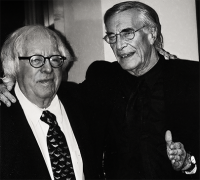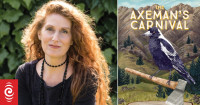
Children's author Paul Jennings reflects on childhood, success and his writing process
abc.net.au – Sunday April 9, 2023

A 13-word letter from a child was probably the most profound piece of writing ever to land in Paul Jennings' lap.
"All he said was: 'Dear Paul Jennings, how come you know what it's like to be me?'," the author says.
"Good grief, you know. That little boy could see himself in my story, which is exactly what I want."
Close to four decades and nine million book sales have transpired since Jennings began his career as a children's writer.

Ray Bradbury On Writing and Writers
splashmags.com – Friday April 7, 2023

The following radio interview with Ray Bradbury was recorded over 50 years ago when I was quite young and terribly naive, it was to promote the release of the movie Something Wicked This Way Comes. What Ray Bradbury spent much of the time talking about was how many in society tried to tell us what we should and shouldn’t read, think and what can and cannot be imagined. It was, I think, a counseling session as much as an interview, encouraging myself and others to follow their heart and go their own way. Revisiting this interview has helped me recover my stalled creative momentum and I hope it will serve that purpose for others who read this.
Ray gave me the best advice about writing. Write! Who cares what’s published or heard tell the stories you want to tell. In his book Zen In The Art of Writing he talks about writing as a panacea for those living in troubled times. “While our art cannot, as we wish it could save us from wars, privation, envy, greed, old age or death, it can revitalize us amidst it all.”

5 Key Tips for Writing About the Neurodivergent Without Stereotyping
crimereads.com – Friday April 7, 2023

A neurodivergent psychotherapist (and author) offers up guidance on creating your ND characters
If I were a comic book heroine-or villain-the following would be my origin story:
When I was seven years old, my teachers called my mother in for a conference, informing her they didn’t think I was going to cut it at their fine academic institution. It was a small, Hebrew day school, with only twelve kids in my graduating class. Half the day we focused on our secular studies and the other half praying, studying Talmud, and learning how to read and write Hebrew. Think of it as the Jewish equivalent to Catholic school-equal amounts of guilt, but no penguins with corporal punish kinks. I would sit in class and stare off into seeming nothingness: eyes glazed with my mouth hanging slack, because Florida is a swamp I’m still allergic to and I had breathing issues. I would put two dots for eyes on my fingertips and pretend they were people under my desk.
My mother took me in for psychoeducational testing which lasts hours—at least I think it did. I have time blindness, which means without a clock in my face, I have no concept of time. At the end, a lady gave me blank paper and crayons, saying I could color anything I wanted. And I remember thinking, ‘whatever I draw, she’s going to think that’s how I feel about myself.’ So I drew what was expected of me: a little girl smiling under a brilliant sky of blue, surrounded by flowers and endless possibilities. When she came collecting, I saw her eyes scan my creation, the smallest hint of a smile curling the corner of her mouth. I had passed—both the test and my first-time masking as normal.

How to Query Your Sci-Fi/Fantasy Novel and Get Repped by a Literary Agent
theportalist.com – Friday April 7, 2023

A literary agent can help you sell your book to a major publishing house. These tips can help you sell yourself to agents.
You’ve written a novel! First, take a moment and congratulate yourself for making it to the end. After you’ve edited, revised, and gotten critical feedback from critique partners and beta readers, you might be thinking: What’s next? For anyone considering a career in traditional publishing, the next step is querying.
Querying is the process of finding an agent to represent you. To have your manuscript considered by any of the Big 5 publishing houses, you typically need a literary agent. The querying process typically requires three parts: a letter to the agent, a one- or two-page synopsis of the plot, and a short writing sample — typically the first five to 15 pages of your novel, depending on the agent. This guide will break down each of the three components of your query, plus resources you can use to identify the right contacts and attract the attention of a literary agent.

How a Tiny Literary Magazine Became a Springboard for Great Irish Writing
nytimes.com – Wednesday April 5, 2023

The Stinging Fly has helped launch several of Ireland’s most promising writers. How has a publication with 1,000 subscribers carved a niche in the Irish canon?
Before Sally Rooney was the author of best-selling books, and well before those books became buzzy television series, she was an undergraduate student at Trinity College Dublin with a growing pile of unpublished poems and no contacts in the writing world. Her first break came in 2010, when The Stinging Fly, a small Irish literary magazine, agreed to publish her work.
For Colin Barrett that career turning point arrived in 2009, with the publication of his short story “Let’s Go Kill Ourselves” in The Stinging Fly. Four years later, Barrett’s debut collection, “Young Skins,” was released via the magazine’s adjacent press to international acclaim. Barrett went on to win the Frank O’Connor International Short Story Award and the Rooney Prize for Irish Literature.
The Stinging Fly has been something of a revelation in Irish literature. Founded in Dublin in 1997 by Declan Meade and Aoife Kavanagh as a receptacle for “all this great writing floating around,” as Meade said, it earned government support and has reached its 25th year as a launching pad for some of the country’s most promising, and in time, some of its best known, poets and novelists. As such, it has also become prime poaching ground for editors in other countries hungry for Irish talent.

How to Pitch to a Literary Agent
lithub.com – Wednesday April 5, 2023

In the latest “Craftwork” episode, a deep-dive conversation about literary agents with Carly Watters, herself a longtime literary agent and the co-host of the popular writing podcast The Shit No One Tells You About Writing. Carly is “very online” with a keen understanding of the digital landscape and the challenges faced by contemporary authors. In this episode, we discuss what you need to know about pitching a literary agent, what agents are looking for in writers—and more.

What’s the Selling Attitude?
By G. Miki Hayden
Instructor at Writer's Digest University online and private writing coach
firstwriter.com – Saturday April 1, 2023

I had a client at one time (writing of course) who forever insisted she was going to sell. Someone must have told her to be relentlessly positive, but her words rang out a false note when she pursued that stance. I couldn’t quite place my finger on it, but not only did I disbelieve her, but I found her Mistress of the Universe tone somehow irritating. She seemed to be hammering away at the question of placing her work rather than the issue of how to write a novel that was worth selling—pursuing her craft.
Don’t get me wrong. After writing a good novel, the objective is placing the novel and receiving the payoff. We all want that. The money (some money, anyway), the accolades…the money. We want readers.
But is being positive enough after writing a pretty darn good novel?

‘Normal People for married people’: How to land a book deal for your first novel
irishtimes.com – Wednesday March 29, 2023

Lauren Mackenzie is just the latest writer to benefit from the Irish Writers Centre’s Novel Fair, which helps pair new talent with literary agents
Kevin Barry once said he’d wager that “some of the most brilliant writers who ever lived have never been published”. He was making a case for the importance of discipline over talent. (In his scenario, the brilliant writers hadn’t managed to complete any work.) But what of those brilliant and disciplined writers who have gone undiscovered, their manuscripts sitting latent on a laptop?
Over its first 12 years the Irish Writers Centre Novel Fair has uncovered a great many such writers and manuscripts. The speed-dating-style pitching event, whose 2024 edition is launched today, seeks to bridge the gap between yet-to-be-discovered talent and industry professionals.
First, writers are chosen by a panel of judges, based on the opening 10,000 words of a manuscript. Next, these writers polish and submit their completed novel. After that comes a seminar, where the budding authors are briefed on the pitching process. Then comes the fair itself, at which they pitch their novel to agents and publishers in the hope of securing representation, a book deal or both.
Among the fair’s past successes are Michelle Gallen (Big Girl, Small Town), Caitríona Lally (Eggshells), Kevin Curran (Beatsploitation), Olivia Fitzsimons (The Quiet Whispers Never Stop) and, recently, Lauren Mackenzie, whose debut novel, The Couples, will be published by John Murray in July.

How Annette Lyon Went From Writing "Sweet Romance" to Suspense
crimereads.com – Wednesday March 22, 2023

People who know me as a romance writer might see my new suspense novel as something that came out of nowhere. At first glance, my history would bear that out.
When my first novel was published by a small press, I really didn’t like the title they picked. It sounded too romantic for a book where, to me, the entire point was something else: the concern of a mother for her child. I made some tweaks so the title would point to that underlying theme. It had a suspense subplot, but there wasn’t really a way to get that across in the title or cover.
My second novel also had a romantic arc and a suspense subplot. My third was my first foray into historical fiction, which scared me. Readers said it was my best work yet, which told me that stretching myself had probably made me grow as a writer. That story also had a mother deeply concerned about her daughter. It didn’t have a suspense subplot, but it did open with a house burning down.
What I thought would be my fourth was a murder mystery, but the publisher suggested I do more historical, as my last book had outsold the others. I set the mystery—and my suspense ideas—on a shelf to gather dust with the many creepy resource books I’d collected about poisons, death, injury, firearms, and more.

Does it pay to be a top author?
rnz.co.nz – Sunday March 19, 2023

Does it pay to be a great novelist in New Zealand? The Detail talks to two authors about how they make a living spinning a good yarn.
Catherine Chidgey
Catherine Chidgey has been writing novels for almost 30 years - and she's one of our most celebrated writers on the scene at the moment.
Every morning, she's up at 6, writing. She does the school run, goes to her day job as a lecturer in creative writing at Waikato University, gets home, dinner, and then she's in bed - again, writing.
"It's insane," she laughs. "I don't recommend this schedule for anyone out there. Basically I have no other life."
She's just cracked the shortlist for the Jann Medlicott Acorn prize for fiction in this year's Ockham New Zealand Book Awards, for her 2022 novel The Axeman's Carnival.
It's a prestigious prize, too - carrying a $64,000 pay-out to the successful author.
But Chidgey's not in it for the money. She's in it for the passion.
Get the free newsletter | Submit a news item or article | Get Writers' News for your website





